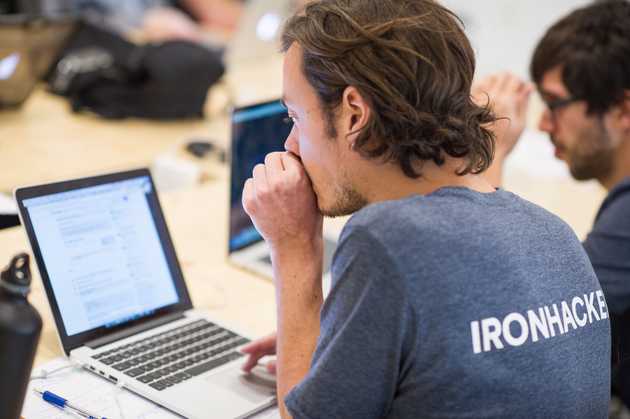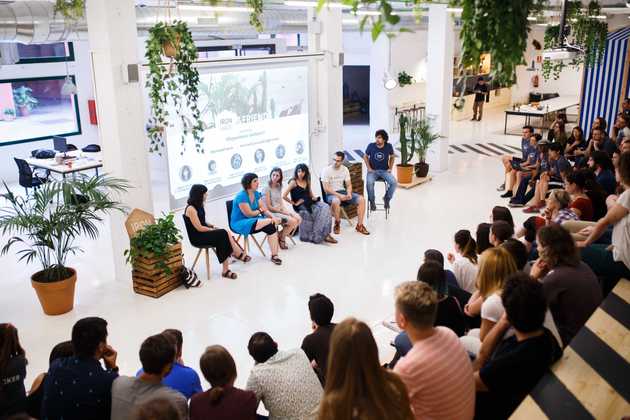Curiosity Trumps Everything
At some point, any hard skill will inevitably become a commodity. The ability to adapt, retool and learn new things will become the keys to master your own professional fate.
If you are somewhat up to date with the news coming up from the education world, you will have noticed some controversy, to say the least, around inaccurate placement metrics, programmers bubbles and this whole apocalyptic narrative about bootcamps and the future of education.
Under other circumstances, I would not indulge in commenting on such a critical subject. But after more than two years as the GM at Ironhack here in Barcelona1, I almost feel the obligation to tell the story of what it is like to join a bootcamp and the prospect of getting a job afterward.
The Students
First of all, I wanted to shed some light on the background of the students we take in and demystify this whole Computer Science myth. While it is true that a small subset of our graduates already held an engineering degree when they joined the bootcamp, the majority of them did not. With the data right in front of me, I can assure you there is no correlation at all between prior “formal engineering education” and higher hiring rates at the end of the program.
Our students are usually recent grads or early career changers. They are attracted by the prospect of doing creative work, mastering the craft and joining the tech industry. They come from very diverse backgrounds, true, but they do share something unique: they are insanely motivated individuals that want to see a change in their lives.
This is not a coincidence though. It is no secret we select our students — of course, we do. But we don’t do it in an are-you-already-an-engineer basis. Our criteria are easier than that: we look for passion, grit, and resilience, regardless of your background.
So is a bootcamp suitable for everybody? No, it is not. A bootcamp is a remarkably hard experience. But it is also not a matter of being a CS or not, it is a matter of willingness.
I do believe anybody can learn anything, but the question is: are you willing to sacrifice, prioritize, commit in order to fulfill a larger vision and build a remarkable future?
Again and again, the ones who answer “yes, I do” to this question are our students.
The City
I was born and raised in Barcelona. I have been living here for almost my entire life, but what has happened to this city during the last five years is beyond extraordinary. I do not have the proper words to accurately describe what it has been like to go through this whole transformation, but I can focus on a small portion of this change: the tech ecosystem.
For several reasons, beyond the scope of this post, Barcelona has become home to the creation of countless startups and incumbent tech companies headquarters. They have turned the city into one of the most prominent European ecosystems.
Want it or not, tech companies create tech jobs. Barcelona has been an exceptionally fertile tech ground, and as a byproduct, the demand for tech jobs — i.e. Web Developers, UX Designers or Digital Marketers, has exploded. Thus “where to find tech talent” is a conversation I am having, without exception, every single day. At this pace, it is about to become the favorite water-cooler theme.
To put it in other words, there is a gap: companies need certain skills that traditional education is not providing. We aim to close this gap by teaching the skills these companies need. While I understand this gap is not infinite nor will it last forever — as with any other market need, osmosis will take care of it, I can assure you, at this point in time, we do not graduate enough students to even begin to meet this demand.
The Hiring Week
The last week of our programs is called the Hiring Week. As its name suggests, this week is the mechanism that fulfills our vision of being an outcomes-driven institution, maximizing the ROI of each penny students invest.
Just think about it for a second: for any given investment, you expect a return, the bigger the better. We do not understand why education should be any different. We are convinced returns can be measured anywhere, and our golden metric is, without a doubt, the ability to employ our students right after they graduate.
But let’s not detour from the topic, because for all intents and purposes, going through a Hiring Week is a remarkable experience2 by itself. The week starts with two entire days where recruiters and HR professionals come in and simulate mock interviews, review CVs, optimize LinkedIn profiles… It is a two-day sprint (right after a once in a lifetime exhausting experience) in order to set everything up for prime time.
It is usually Wednesday when the magic happens, the day we summon all our hiring partners to come to campus and meet our recent graduates. Believe me, after two years and 300 graduates in Barcelona, ours has become a BIG network. Regardless of its reach, I personally curated this network and I do know every single person attending to hire our students. It is a subtle detail, but it makes all the difference in the world. Because this is not a random job fair, this is the place where companies looking for certain skills come to meet people that have been specifically trained in this direction.
So it is Wednesday morning, all the graduates are already sitting at their designated spot, waiting for the doors to open and the companies to start flowing in. And yes, you have read that right: the students are the ones fixed in the hiring equation. Unlike most job fairs, where there is only a handful of companies and an ever-growing crowd of applicants, at our Hiring Week is the other way around: there are usually more companies than students.
That’s what happens when you are faced with an industry that is thirsty for talent.
The dynamics of the day are rather easy: companies come in and sit down, one by one, with all the graduates. For our students, the experience is as natural and fluid as it gets: wide-ranging, inspiring conversations with no time constraints around what they’ve built, their passions and whether they see themselves in a certain company. It is all carefully designed to recreate an environment where our graduates feel comfortable and secure, a place that enables them to show the full extent of their potential.
On the other hand, for companies, it is also a great place to be, where they can meet talent that most certainly will suit their needs. But it is at the same time a challenging situation where they come to realize they do not have the leverage the system they were used to. They find themselves without the hygge of their comfy headquarters and they can see other companies contend for the same candidates, the pressure is also on them.
The experience is intense. Conversations span the whole day, until late in the evening. On their way out, with no exception, they repeatedly share with me the same comment: “it is incredible they were able to learn so much in such a short period of time.” They are, indeed, impressed.
At the Hiring Week, tables have turned. It is the most vivid realization that talent is at a prime in the tech industry and there is no hint, at least in the short term, this situation is going to change.
What Will Get You the Job
The Hiring Week is a soundly engineered artifact that helps us get the job done (no pun intended), and it does work. In Barcelona, the combination of a thriving tech ecosystem and our relentless efforts to bridge the gap between industry and education is rewarding us with a hiring rate over 80% three months upon graduation — which no matter what, is in itself an impressive feat.
At the end of the day, getting our graduates hired is what success looks like from my perspective. It is actually one of my most important KPIs, definitely a pressing one. But after witnessing more than 200 graduates, I can assure you the most successful hires were not ultimately because of the Hiring Week. They were because of passion and hard work.
Passion and hard work were the ultimate reasons we could help a guy find a job “next to the beach, in a workplace where I can catch some waves during the lunch break.” Or maybe that one that wanted “a startup job” in a city that had no tech ecosystem at all3. Or a coal miner, a flight attendant, a photographer… the list goes on and on, but they do share something, and it is not a tech background.
Companies are not looking for a “Junior Web Developer”. Instead, they are looking for problem solvers, curious minds that can relate to the company vision and bring something to the table beyond mere technical skills. Don’t get me wrong. By no means, I am saying skills are not important. You need to know how to code to get a job as a programmer, but coding skills alone will only get you the interview, not the job.
Any hard skill will inevitably become a commodity at some point in time, even programming. But the ability to adapt, retool and learn new things are the wild card that will open countless doors and enable you to become the master of your own professional fate.
And that’s deep. In fact, its implications bring us again full circle to the very first paragraph. Because it moves the bootcamps-will-get-you-a-job discussion to a whole new dimension. It is abstracting the skills out the equation. So it is not a matter of what we teach anymore.
This is precisely what relieves me, what makes me believe that life changing education is possible and it will continue to be. Because it is not ultimately about the Hiring Week. Because it is not a matter of what we teach. It is a matter of attracting exceptional individuals and enabling them with the right tools, the ones that will get them through the company doors.
Then only wait and see how curiosity, passion and hard work, will do the rest.
- As a Tech School we don’t limit ourselves to coding skills. We also have an extremely successful UX/UI program, with similar hiring rates than its Web Development sibling, and plan to open new tracks in the near future. Though this particular post is mainly focused on coding and the Web Development track, its conclusions apply to any other craft.↩
- We have come a long way since our first Hiring Week and in just two years it has already gone through several iterations in each campus. While the essence remains the same, we have taken into account an insane amount of feedback, fine tuning the format, the contents and always optimizing and obsessing over hiring rates.↩
- Still today I believe the guy literally got the first tech-related job in the whole town. In fact, he was the employee number one for that company. Therefore if the bare minimum expression of a tech ecosystem was ever created there, make no mistake, that guy was one of the founding fathers.↩


